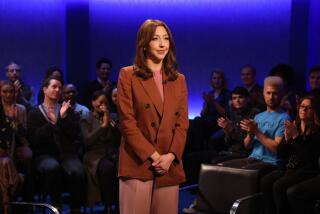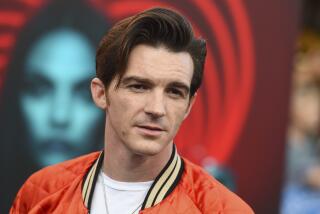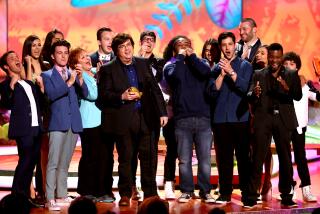Q&A: Zach Galifianakis and Jonathan Krisel, of FX’s ‘Baskets,’ talk about clowning around for TV
There isn’t really time for hellos when Zach Galifianakis has a pressing question.
“If you see a mouse yawn, does that then make you yawn?”
The 46-year-old comedian had just sat down for an interview during a recent round of promotion for his new FX series “Baskets,” and his stream of consciousness introduced itself.
See more of Entertainment’s top stories on Facebook >>
“Lions yawn all the time. If I’m in a safari, would seeing a lion yawn make me yawn?” asked Galifianakis, whose scruffy facial hair would surely make for a strong frame to such deep inhalation. “Like, does it translate over? And since we’re so close to monkeys, would we yawn if we see them yawn? Do you think Hitler ever yawned? You don’t ever imagine him yawning.”
Then “Baskets” executive producer and showrunner Jonathan Krisel arrived, confused at first, but soon was fully engaged: “Well, like, do pigeons yawn? I sometimes yawn when I see my dog yawn. But is that because we’re essentially family?”
It’s an exchange that could rival the Schweppes drive-thru scene from the first episode of the FX comedy, which made its debut last week as cable’s top comedy premiere in more than a year (1.8 million viewers tuned in over a three-day period, according to Nielsen.)
“Baskets,” which airs at 10 p.m. Thursdays ET/PT, is the first project under FX Productions’ overall deal with Louis C.K. and his production company, Pig Newton. Galifianakis, in addition to serving as an executive producer, stars as a clown with dashed dreams who is forced to get a job as a rodeo clown after undergoing expensive circus training in France.
The Times spoke to Galifianakis and Krisel — about more than just yawning. See what they had to say about the unusual premise for the show, the wonder of Martha Kelly and, well, the levels of Costco memberships.
When there are four hundred and something scripted shows out in the universe, things can start to look and feel the same. And then there’s “Baskets,” about a clown with failed dreams who turns in Paris for Bakersfield. League of its own.
ZG: It’s fun to me because you try to put out something new, but you don’t know if people would be attracted to it.
JK: Yeah, I think we were just trying to make each other laugh. There was one time we were shooting a scene where ... a big pratfall was going to happen. And Zach goes, “You have to make sure that the camera is very far away.” And that’s sort of what the show is. We’re doing big things, but they’re hidden. So it’s like Louie Anderson in a wig — we’re not going, “Look at this! Look at this!” We’re trying to show restraint so it can feel a little more authentic.
G: And I think this show is really going to be good for the clowns in Bakersfield.
How was it when you told FX CEO John Landgraf what the premise of the show would be?
JK: It was brought in under the Louis C.K. deal, so there wasn’t much pitching. But then as the budget started going up and we needed [rodeo] bulls and stuff, they were like, we need to see this. But they were fine.
This show evolved a bit from what you initially set out to do, which was a behind-the-scenes type show of “Between Two Ferns” (Galifianakis’ “Funny or Die” talk show). What prompted the shift to this?
ZG: Well, I think what happened was Jonathan basically talked me out of doing a behind-the-scenes of “Between Two Ferns.” I was kind of like, “God, OK. I thought this was going to be easy.” And then I remember sitting around thinking, and a rodeo clown popped into my head. I think that’s how it went down.
JK: Which to me was just perfect. When he told me that, I was like, “Yes, exactly. That’s exactly it.” You could just see the world that could take shape around that. And then I think it was Louis C.K. who said, “He was trained in France.” And then we were all like, “OK. We have a show.”
... It’s the dream, the hope, the beautiful version of it: Paris, versus Bakersfield. The wife that he has versus Martha. The dreams that you have, versus your own life. And the reality that you came into and this whole, “How can I make these two things work?” But if you don’t have the dream of “Oh, I can be this magical clown” — if you don’t have that, you kill yourself. But if you always have that thing, it keeps you going. Look, he’s a terrible clown, but he has that dream.
And you want him to get it. You want to loan him $40.
ZG: Yeah, you want to root for him, even though he’s kind of ugly and mean a bit. I don’t mean physically ugly.
He is very prickly, and yet poor Martha finds him endearing and shuttles him around with a cast on her wrist.
ZG: I think in my mind, it’s a forced friendship. They’re both lonely. They happen to meet. She has really no other option, as far as socializing. He doesn’t either. And they kind of stick to each other for that reason. He’s mean, but she can take it. Well, something does happen down the road.
JK: But the chemistry between the characters is their real chemistry, so it’s not forced. That’s actually how they are. Off-camera, they are exactly the same.
I’m obsessed with Martha Kelly.
ZG: We all love Martha. She was at the red carpet for the premiere thing, and I look over and she’s like this [mimics hiding from the cameras]. I feel bad for her about that because I don’t want her to be exposed to that.
Did it take much cajoling to get her to do it?
ZG: Over the years, I tried to get Martha to do stuff with me, and she would say no. She was apprehensive. And still, even after we hired her, her confidence level was at zero. I mean, at a complete zero.
JK: There [were] several times where she’d be like, “I can’t do this.”
ZG: “I don’t know how to emote.” But she’s so ... good. She’s hilarious.
Jonathan, what’s it like for you as a showrunner trying to run this ship full of funny people?
JK: This is my preferred method. I want to work with extremely, genuinely charismatic people. And I want it to feel like the whole thing is going to fall apart at any second. Like, Ernie Adams, who plays Eddie, the cowboy guy, he could die at any point in a scene. But he is so committed and so great, and also, you never know what he’s going to say. The first scene in the pilot, where he and Zach are talking, Zach did not know who he was.
ZG: I could not stop laughing.
I was going to ask how in the world you guys keep a straight face in some of these scenes.
ZG: I had to walk off set that day. On the pilot, I had to walk off. I just could not stop breaking. This job was tiring as heck, but I would get up so excited to drive in to work. I have never been as excited to drive to work as I was with this show.
JK: Zach is one of the funniest people in the world. And Louie Anderson is like ... he is so funny.
ZG (to JK): If there’s a Season 2, I’m just going to play the straight guy to him. Just let him go.
JK: Well, you really are the straight guy of the show. Martha and Louie get to shine.
ZG: I love it. I love it.
What discussions were had about the balance of comedy and drama in this series? Because it would seem hard to find the seriousness in it all.
ZG: I would talk to Jonathan a lot about this — a lot. About how the tone and the balance is going to be the hardest thing. But these editors, they found it. They found it in the stuff we shot.
JK: I think a lot of times we were shooting scenes, and our instincts are so teed up for jokes and funny things. And a lot of times I said this scene could have no jokes because it might undermines it. There’s a lot of comedy stuff that is very serious and pretending to be sad. And I said, this has to really be that way. If we make a joke out of it, then we’ve lost our way. So we have to really restrain it.
ZG: There’s an element of surprise in the show, which I think is such a great trick in comedy. It’s my favorite thing when I watch things — to not see something coming.
JK: And also, in my own life, when something is really serious, you do start to laugh sometimes. So that’s what we were trying to do. Can we get into these situations that are really serious and sad and make you laugh. One of my favorite scenes is coming up in the church episode. I don’t want to spoil it, but it’s something to look forward to.
Zach, who do you like playing more: Chip or Dale?
ZG: Dale. He’s so much easier. Chip’s quieter. My mind, for some reason, I wanted Chip to be quiet. Dale, that’s so easy to come up with things. Chip is a little bit more layered and complicated, so he’s a lot harder.
Did you do a lot of clown research?
ZG: I did all the stuff. Well, yeah, when we first started, I looked up a lot of interviews on the gentleman who runs the clown school in Paris [École Philippe Gaulier] that we base this one on. Sacha Baron Cohen went to that school, and so did Isla Fisher, I believe. I’ve talked to people who have gone to it.
JK: Yeah, and we watched some videos about the school.
ZG: He and I also stupidly went to a rodeo. But I had a 5-month-old baby with me. It was so loud. I stayed maybe two minutes. I was surprised, rodeos now are so corporatized. Everyone has a sponsor. That was part of what we want to highlight on the show; we wanted to be blatant about corporate infusion in everyone’s life. Like, Kirkland is not a brand that has been on television.
JK: That encapsulates it. That’s what the show is — it’s Kirkland. The show is about the background moments of life. And Kirkland is the background moments of life. And they didn’t give me money. Wait. Maybe they gave us free water?
What level membership do you have at Costco?
JK: Currently I have none. Growing up, my parents had the executive membership. They’d be the ones who could go in 30 minutes before it opened.
ZG: Wait, wait. Is that a thing? You don’t have to be so snobby about it. I had a membership years ago, but I don’t now. I mean, I’m not going to have seven years of dandruff, why do I need such huge bottles of shampoo?
What about this notion of “Peak TV,” which has become the topic of the industry thanks to your boss? What do you think of it or how has it worked or not in your favor?
ZG: Look, I don’t think this show would have been made had it been conceived as a movie. I mean, try to go sell this to a studio. There’s no way. That’s the business now.
JK: The excessive amount of stuff, all that means is you’re just waiting for someone to help you navigate it. Everyone is sort of taking a step back from having to watch anything yet, ’cause nobody wants to invest unless they know it’s good. We’re hoping people realize this show is worthy of some viewing.
I tweet about TV (and other things) here: @villarrealy
More to Read
The complete guide to home viewing
Get Screen Gab for everything about the TV shows and streaming movies everyone’s talking about.
You may occasionally receive promotional content from the Los Angeles Times.







